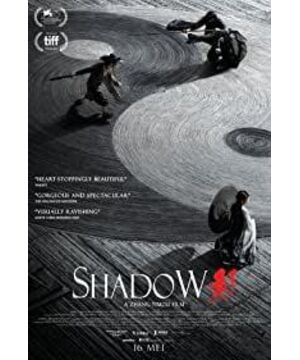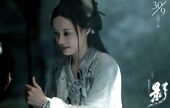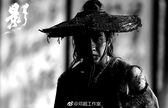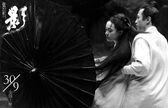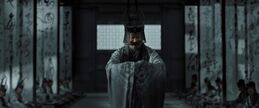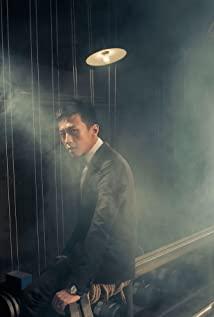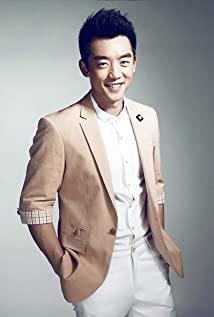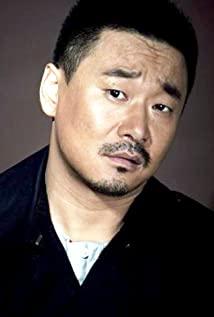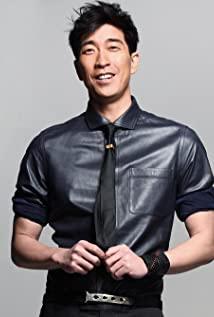Is "Shadow" an aesthetic advancement of Zhang Yimou? Regrettably, it is not.
Since Venice, "Shadow" has started to sell "Chinese aesthetics" with icons such as ink, yin and yang, and Tai Chi. The public's response is also estimated to be very similar to Zhang Yimou's intention. It is generally said that he has abandoned the large color block and high-purity explosion aesthetics of the "Golden Armor" era, and obtained nutrients from the traditional Chinese visual system.
But in fact, there is always a two-word difference between "Shadow" and Chinese aesthetics.
The first is "hidden".
First of all, it is necessary to explain, whose aesthetics is Chinese aesthetics? It is definitely not the spirit of craftsmen (with Yan Liben's artistic achievements, he is ashamed to be called a "painter"), but the orientation of "literati" . They are not purely intellectuals, but they can help the world if they are good, and if they are poor, they will first take care of their official reservists.
This means that the literati aesthetic is the "leader's aesthetic" of the year .
Unlike the current requirement for the colorful, black, elegant and black logo to be as large as possible, the leadership aesthetic at that time was: living far away from the rivers and lakes, and keeping a high mind in the temple. Anxiously saying "I want to ascend to the throne" is a particularly politically incorrect thing. The emperor needs to ask three times and thank him three times, that is, to refuse three times in a row to reluctantly.
The face of a hermit is an extremely important attribute of a political figure, and it is disgraceful to tear it apart easily.
"Whoever said that a fisherman is an idiot, a single leaf is a boat, and he thinks about the sky. It breaks the waves lightly, faces the wind gently, and sleeps with the window in the middle of the sun." It seems that the author is deeply envious of Yuqiao's joy of farming and reading, and wants to fall into the arms of laborers tomorrow - this Who wrote it? Zhao Gou, Song Gaozong.
When he was envious of the fisherman, he did not delay him in writing a warrant to Yue Fei: "...when it is urgent, I will take care of it by the Qing army... If you are like a Qing country, you don't need to say more." , welcome back to father and brother.
"Hidden" is not only a big killer for the proud, but also a blood-recovery agent for the politically frustrated.
After all, in every round of competition, there are only so many winners. If you don’t get along well, you will not be willing to give up. At this time, you need a psychological massage—to comfort yourself: It’s not that we can’t do it, it’s that we are lofty and don’t care about these vulgar people.
Li Bai wrote that "the Son of Heaven could not get on the boat" and "the Ming Dynasty distributed a flat boat", but he did not refuse when Emperor Xuanzong recruited him to be a Hanlin.
After finding his position as a literary jester, the poet left, but he did not give up a fiery heart to serve the people. After the An-Shi Rebellion, he was invited to be the staff of King Yong Li Lin, and was finally involved in the rebellion of King Yong, ending his political career.
"Hidden" can also be understood as an effective self-management, so there is a particularly precise hunger marketing such as "Zhongnan Shortcut": going to Zhongnan Mountain to live in seclusion has always been for the purpose of raising hope, waiting for Mingzhu to broadcast "something" on the World Channel again and again. The Lord of the Ming Dynasty likes to mention the post of Dragon Slayer."
If you don't understand the magic of this hidden method, you can't play the traditional Chinese political game.
Look at "Shadow" again, where is the mistake? Too aggressive, too aggressive, too reckless.
It can be seen that Zhang Yimou's understanding of the court and the monarchs and ministers is very straightforward and naked, and it is a kind of palace fighting thinking born out of folk drama . The shift in the political center of gravity is achieved through voyeurism, cheating, sneak attacks, pulling hair and tearing sleeves to poison each other.
Originally, Jingzhou had been imprisoned in a secret room since childhood, the governor had been imprisoned in a secret room after he fell ill, and Peiliang had imprisoned himself in a mask of being foolish and afraid of death. They all had different motives and ways to "hide" behind power.
But Zhang Yimou handled the dark side of this kind of power by placing it under the shadowless lamp and handling it with extra strength and fullness.
Jingzhou is like a stunned head. He has been submissive and bowed his head. He is a very passive character until Xiao Ai's dedication enlightens him. He finally fights for his love, but by this time the movie has passed ⅔.
Ziyu appeared as a madman, a metaphor of wretchedness, madness and incompetence. The side of "Fengshen Ruyu" and "Qu You Wrong Zhou Lang Gu" only exist in other people's lines;
Peiliang has done relatively well in reversal, but regardless of the saliva in the early stage or the blackening in the later stage (spoiler. But anyone here can't guess the reversal), the scale is also very full.
Is "Shadow" just a story of a stand-in? No. It's supposed to be about power struggles on the A-side and B-side metaphors of politics. But the most important power triangle, including the stand-in Jingzhou, the governor Ziyu, and Peiliang, none of them was willing to take it back.
A movie that only talks about sex is called a pornographic film; it only talks about money and money is a reality show;
The second character in "Shadow" is called "empty".
This time, Zhang Yimou learned a lot of the white space in landscape painting. This is wrong again.
Although Zhang Yimou resisted the iconic thick ink and used only black and white ash, he still couldn't help filling those places that should have been "empty" with eaves, mountains and clouds, and this "white" was left blank . Still stuck in panic.
The literati painted ink landscapes, not to record the endless beauty of "Impression XX", but " imagined landscapes ".
In Ni Zan's "Rongxie Zhai Tu", which is praised as the most noble, the most important thing is never the hermits and pedestrians in the dry mountain, and 3/4 of the important positions must be left to the sky. To borrow a sentence from Yan Yu's poems, "Like the sound in the sky, the color in the picture, the moon in the water, the image in the mirror, the words are full and the meaning is endless."
Without this space, it would not be able to set off the steep withered rocks and the leisurely landscape.
What is empty? Jin Yuelin wrote that in the Heart Sutra "emptiness is not different from color and form is not different from emptiness", this "emptiness" is neither "nothing" nor "empty space", but should be interpreted as "0" in the counting method: "There is nothing, but it does exist. , is indispensable." (Jin Yuelin, A Modern Interpretation of the Heart Sutra)
Without this emptiness, it would not be able to transform into cosmic dust, a thousand red dust.
"Shakespeare" is also known as a tribute to Shakespeare. But Zhang Yimou's films never dare to "take a step back", so the real seriousness and sadness are always absent.
The filming of "Shadow" is called a play, and it has been running on the way to finish the plot and complete the reversal, and there is almost no spare moment for the characters to talk to themselves.
The camera does not even dare to give the actors a second of brewing and pause. Once the characters are out of the background of human nature, they can only be reduced to functional props.
The biggest selling point of Deng Chao's performance this time is that weight gain and weight loss are divided into two roles.
But Zi Yu is always hunched over, with messy hair and flickering eyes. Where are the two fates with the same silhouette? Since it is such a waste of actors, why insist on one person playing two roles?
The transformation of Jingzhou is also a very elementary way of dealing with it: from a small person who just wants to go home, to finally complacent with the victory of power, the alienation of a personality is completely completed through forced conflict, and almost any person who wanders alone, questioning, and aftertastes space.
There are also three characters in the play who face the death of a loved one.
Jingzhou, played by Deng Chao, finally returned home, only to find that his mother had passed away. What should he do? Tiger eyes wide open and roar? It's too late to deal with a TV series like "Mother, why didn't you wait for me" - the assassin is already online.
Let's talk about Xiao Ai played by Sun Li. She witnessed her husband, Zi Yu, being killed by Jingzhou. As the initiator and bystander, a participant who did not do anything has been swaying and running around in the camera, turning the role of the Duchess into a murder scene evidence.
There is also Zheng Kai's King Pei, whose performance of witnessing the death of his sister is even more of a stage-based treatment for the Spring Festival Gala. Crying up to the sky in the rain, he did the work that Deng Chao didn't have time to do.
Maybe he borrowed from The Godfather 3 Corleone witnessed the death of his youngest daughter? But when the godfather cried to the sky, the world was silent.
The greatest grief comes from silence and restraint. Dare to pause and understand emptiness is an advanced thing.
Not to mention it's all the actors' pot. This group of actors is too many variety shows to lose their freshness, and it is true that young Xiaohua Xiaosheng is not powerful enough. But the director himself does not dare to be slow or empty, and he has to pay the main responsibility.
Not to mention that Zhang Yimou came from a peasant background, but Hou Hsiao-hsien came from a gangster. The filming of "Nie Yinniang" has made a great contribution to the reproduction of Chinese aesthetics.
The sense of history does not come entirely from artifacts and props. The five thousand-year-old river is there. Whether you fish out stones or gold, after all, it is a "god meeting" between history and beauty .
As Nigel wrote in his "Chinese Art and Wisdom": "Shenhui is what distinguishes the real artist from the vulgar craftsman."
References are as follows (quote errors are mine):
"Heart Painting" (US) by Bu Shoushan, translated by Pi Jiajia
"Forty Years of Li Lincan Reading Paintings" by Li Lincan
The Moving Peach Blossom Land by Shi Shouqian
Text | From my official account: I am always too good to myself
Figure | From the Internet, not for commercial use
View more about Shadow reviews


